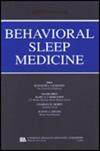失眠症患者睡眠参数与抑郁症状之间的日常关联:研究作为中介的情绪反应和调节。
IF 2.2
3区 医学
Q3 CLINICAL NEUROLOGY
引用次数: 0
摘要
目的 以前的研究表明,失眠和抑郁症状可能存在因果关系。有人提出情绪反应和调节可以解释失眠和抑郁之间的潜在因果关系。然而,对其中介效应的纵向评估却很有限。因此,本研究旨在考察情绪反应性和调节性对失眠患者14天内每日睡眠参数和抑郁症状之间纵向联系的中介效应。他们每天早晚各填写一份调查问卷,并连续 14 天佩戴行动计手表。五项睡眠参数分别通过晨间调查的睡眠日记(主观总睡眠时间、主观睡眠效率和睡眠质量)和动图手表(客观总睡眠时间和客观睡眠效率)进行测量。晚间调查使用国际积极和消极情绪表简表、情绪调节问卷和认知情绪调节问卷对白天的情绪反应和情绪调节策略进行评估。结果表明,失眠患者的睡眠质量和抑郁症状以及动图测量的睡眠效率和抑郁症状可以相互预测,其中负性情绪反应起中介作用,而情绪调节不起中介作用。本文章由计算机程序翻译,如有差异,请以英文原文为准。
Daily Associations Between Sleep Parameters and Depressive Symptoms in Individuals with Insomnia: Investigating Emotional Reactivity and Regulation as Mediators.
OBJECTIVES
Previous research suggests that insomnia and depressive symptoms might be causally related. Emotional reactivity and regulation have been proposed to explain the potential causal relationship between insomnia and depression. However, longitudinal evaluations of their mediating effects are limited. Hence, the current study aimed to examine the mediating effects of emotional reactivity and regulation on the longitudinal associations between daily sleep parameters and depressive symptoms over 14 days in individuals with insomnia.
METHODS
Participants were sixty adults aged 18-65 who had clinically significant insomnia. They filled out a survey each morning and evening and wore actigraphy watches for 14 consecutive days. The five sleep parameters were measured by sleep diary in the morning survey (subjective total sleep time, subjective sleep efficiency, and sleep quality) and actigraphy watches (objective total sleep time and objective sleep efficiency). Emotional reactivity and emotion regulation strategy use during the day were assessed in the evening survey using the International Positive and Negative Affect Schedule Short Form, Emotion Regulation Questionnaire, and Cognitive Emotion Regulation Questionnaire. Depressive symptoms of the day were evaluated in the evening survey with the Center for Epidemiologic Studies Depression Scale.
RESULTS
Results showed that sleep quality and depressive symptoms, as well as actigraphy-measured sleep efficiency and depressive symptoms, predicted each other in individuals with insomnia, mediated by negative reactivity but not emotion regulation.
CONCLUSIONS
The present findings support the mediating role of negative emotional reactivity in the bidirectional, daily relationship between sleep parameters and depression in individuals with insomnia.
求助全文
通过发布文献求助,成功后即可免费获取论文全文。
去求助
来源期刊

Behavioral Sleep Medicine
CLINICAL NEUROLOGY-PSYCHIATRY
CiteScore
7.20
自引率
3.20%
发文量
49
审稿时长
>12 weeks
期刊介绍:
Behavioral Sleep Medicine addresses behavioral dimensions of normal and abnormal sleep mechanisms and the prevention, assessment, and treatment of sleep disorders and associated behavioral and emotional problems. Standards for interventions acceptable to this journal are guided by established principles of behavior change. Intending to serve as the intellectual home for the application of behavioral/cognitive science to the study of normal and disordered sleep, the journal paints a broad stroke across the behavioral sleep medicine landscape. Its content includes scholarly investigation of such areas as normal sleep experience, insomnia, the relation of daytime functioning to sleep, parasomnias, circadian rhythm disorders, treatment adherence, pediatrics, and geriatrics. Multidisciplinary approaches are particularly welcome. The journal’ domain encompasses human basic, applied, and clinical outcome research. Behavioral Sleep Medicine also embraces methodological diversity, spanning innovative case studies, quasi-experimentation, randomized trials, epidemiology, and critical reviews.
 求助内容:
求助内容: 应助结果提醒方式:
应助结果提醒方式:


